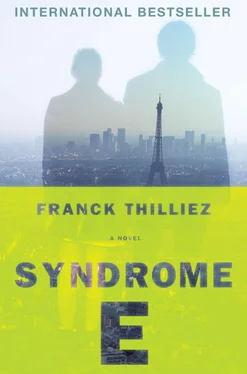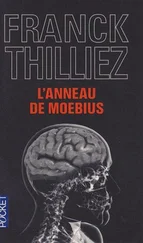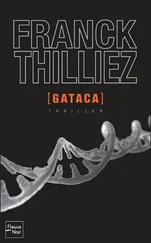“I figured you’d come sooner or later. After Manoeuvre’s death and Chastel’s suicide, the dominos were falling one by one.”
She tilted her head, as if trying to read into Lucie’s thoughts.
“Don’t judge me too harshly, young lady, as if I were the worst sort of criminal. I only hope that in coming here, you’ve understood what my father and I were seeking to accomplish.”
Behind her, Sharko whispered into the squad leader’s ear. The next moment, he and his men retreated from the room, leaving Sharko alone with Quinat and Lucie. Sharko closed the door and stepped forward. Lucie couldn’t contain her rage:
“Accomplish? You slaughtered a defenseless old man, you… hanged him and disemboweled him! You riddled the bodies of a woman and her boyfriend with stab wounds, who weren’t even thirty years old! You are the worst sort of criminal!”
Coline Quinat sat on her bed, resigned.
“What can I say? I’m a Patient Zero and I’ll be one all my life. Syndrome E emerged from my head that summer day in 1954. The violence became… embedded… inside me, and its ways of expressing itself are not always the most… rational. Please believe that if I could have dissected my own brain, I would have. I swear to you I would have.”
“You are insane.”
Quinat shook her head and pinched her lips.
“Inspector. None of this was supposed to happen. None of it. We just wanted to get back the copies of the film that Lacombe had strewn about. And we’d succeeded, for most of them. We had even gone to the United States. But… there was that cursed reel, which had traveled from Canada to Belgium. And then Szpilman. People like him exist, paranoiacs who dwell on conspiracies and the secret service, and they’re the ones who frighten us most. Because they react the minute there’s a malfunction—it’s like they have a… sixth sense.”
Sharko was standing next to Lucie.
“You said ‘we.’ ‘We’d succeeded,’ ‘we wanted to get the copies’… Who is this ‘we’? The French secret service? The army?”
She hesitated, then finally nodded.
“People. A lot of people who labor every day to safeguard this country. Inspector Sharko, don’t confuse us with the riffraff you meet in the streets. We’re scientists, thinkers, decision makers; we make the world go forward. But every advance demands sacrifices, whatever they may be. It’s always been like that. Why should it change now?”
Lucie could no longer sit still. This calm and levelheaded discourse, coming from the mouth of a lunatic, was making her seethe.
“Sacrifices like those poor Egyptian girls? They were only children! Little girls, like you were! Why?”
Coline Quinat tightened her jaw. She was trying not to talk, but the need to justify herself was too powerful.
“My father passed away two years before the Burma genocides. He spent his entire life looking for manifestations of Syndrome E. The proof of its existence. He never went into the field, because he knew perfectly well that one could re-create it and study it in the laboratory. He used me, then dragged me in his wake, trained me, conditioned me to pursue his quest. Science studies, medical school, specialization in neurobiology. I had no say in the matter, I was… enlisted.”
“Did they send you there? To the places where these genocides had occurred?”
“They did—with legionnaires, humanitarian aid groups, Red Cross doctors. We collected corpses and stacked them up by the dozens before they could start to rot. I took advantage of the occasion to study their brains. I had official accreditation.”
“And what about Egypt—did you have official accreditation there as well?”
“Mass hysteria phenomena with violent manifestations occur so seldom and randomly that it was… almost impossible to do any serious studies. Naturally I went to Cairo.”
“And you killed those girls. Mutilated them. Working alone, this time, without any orders. Or accreditation.”
She answered evenly.
“There was only one way to verify that it was Syndrome E, and that was to open their skulls and look inside their brains, at the amygdala, to see if it had atrophied. At the time, we didn’t have the kinds of scanners we have today. As for the mutilations”—she clenched her teeth—“that’s just how it was. No doubt you’ll call it uncontrollable impulses, or sadism, and you’d probably be right. Our minds have not begun to reveal all their secrets. Your old historian unfortunately had to bear the brunt of it. I wanted to show you that you weren’t dealing with… one of those common criminals that are your daily bread. This case went far, far beyond that. I hope it had the desired effect.”
A heavy silence, then she continued:
“My methodology in Cairo did not entirely please the powers that be, to say the least. But when they got wind of a telegram that some Egyptian cop had sent, they had no choice: they had to cover me, and themselves as well. Everything else was just collateral damage.”
Lucie felt it all, every murderous impulse. The confirmation that the upper echelons of power had protected a woman who was dangerously insane, a murderer who would stop at nothing in the name of scientific progress, made her shake with rage.
“Once back in France, I studied those brains, and I noticed that the amygdala of those Egyptian girls had indeed atrophied. Do you realize what that means, Inspectors? We weren’t talking about some genocide. The phenomenon had no particular origin, it had occurred with no real explanation, and it was capable, in certain cases, of propagating violence, sealing it once and for all into our head. I had concrete, definitive proof that Syndrome E truly existed and could strike anywhere. At anyone! You, Detective. Me, anybody. It crossed over years, peoples, and religions. I verified it again that same year in Rwanda. A very… fruitful time, if I may say so. I went into the mass graves, walked through the bodies, and once again I opened skulls. Imagine my amazement. One person’s violence spreads to the brain of another, atrophying his amygdala and making him violent in turn. And so on, one after the other. A veritable contagion of violence. This was a major discovery, which challenged so many fundamental concepts of how we understood massacres…”
“An understanding that you and your collaborators kept to yourselves, naturally.”
“The stakes were so high—not just militarily, but geopolitical and financial. Secrets had to be preserved. Mastering the emergence of Syndrome E and learning how to trigger it became my obsession. The last random manifestation to date is the one that happened at the Foreign Legion post. No matter where or how hard I looked, for years on end, the ‘creation’ of another Patient Zero was impossible. It required too much waiting and observation. It also needed test subjects. At the time, in 1954, scientists had a lot more leeway; they could profit from the excesses of the superpowers and their secret services. They had ‘raw material’ at their disposal, as in the back wing of Mont Providence Hospital. I was that raw material.”
It was monstrous. The woman had become a block of cold meat, without emotion, without remorse. The purest, most extreme example of the relentless scientist.
Quinat sighed.
“But today, as we speak, there is a much quicker solution, which my father had already pointed out. A solution that technological progress has finally given us. Electrodes planted in the amygdala, which trigger extreme aggressive behavior with the simple push of a button, then spread the phenomenon to those nearby. You just have to place them in conditions of stress and fear, and get them used to authority so that Syndrome E will take root more easily.”
Читать дальше












